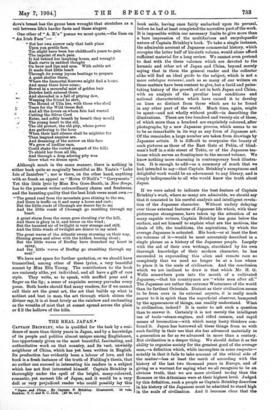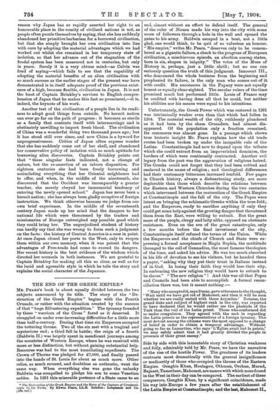CAPTAIN BRINKLEY, who is qualified for the task by a
resi- dence of more than thirty years in Japan, and by a knowledge of its people and politics almost unique among Englishmen, has opportunely given us the most beautiful, fascinating, and authoritative work on that country, and its vast, unwieldy neighbour of China, which has yet been written in English. Its production has evidently been a labour of love, and the book is a fresh instance of the truth of Fielding's thesis, that no author can succeed in interesting his readers in a subject which has not first interested himself. Captain Brinkley is thoroughly under the spell of the bright, many-coloured, romantic, yet earnest life of Japan, and it would be a very dull or very prejudiced reader who could possibly lay this • Japan and China. By Captain F. Brinkley. Illustrated. 12 vols. London: T. C. and E. C. Jack. [A8 8a. net.] book aside, having once fairly embarked upon its perusal, before he had at least completed the narrative part of the work. It is impossible within our necessary limits to give more than a bare impression of the multifarious and encyclopaedic nature of Captain Brinkley's book. To take a single instance, the admirable account of Japanese commercial history, which occupies the latter half of his sixth volume, would alone afford sufficient material for a long review. We cannot even pretend to deal with the three volumes which are devoted to the keramic and other art of Japan and China, beyond merely saying that in them the general reader and the collector alike will find an ideal guide to the subject, which is not a mere catalogue raisonne, such as so many of our writers on these matters have been content to give, but a lucid and pains- taking history of the growth of art in both Japan and China, with an analysis of the peculiar local conditions and national characteristics which have caused it to develop on lines so distinct from those which are to be found in any other part of the world. Much time, again, might be spent—and not wholly without profit—in describing the illustrations. There are two hundred and twenty-six of these, of which more than a hundred are exquisitely coloured, after photographs, by a new Japanese process, which seems to ns to be as remarkable in its way as any form of Japanese art.' Of the remainder, a large number are taken from drawings by Japanese artists. It is difficult to overpraise the beauty of such pictures as those of the East Gate at Pekin, of blind- man's buff in a side street of Tokio, or of the Japanese tea- house which serves as frontispiece to the second volume. We know nothing more charming in contemporary book illustra- tion. It is enough to add—as a summary of much that we had intended to say—that Captain Brinkley's sumptuous and delightful work would be an adornment to any library, and is simply indispensable to all who would know the truth about Japan.
If we were asked to indicate the best feature of Captain Brinkley's work, where so many are admirable, we should say that it consisted in his careful analysis and intelligent revela- tion of the Japanese character. Without unduly delaying over those external features of Japanese life which, with their picturesque strangeness, have taken up the attention of so many capable writers, Captain Brinkley has gone below the surface, and set himself to explain what are the motives, the ideals of life, the traditions, the aspirations, by which the average Japanese is actuated. His book—or at least the first six volumes of it—would be most accurately described in a single phrase as a history of the Japanese people. Largely with the aid of their own writings, elucidated by his own thorough knowledge of their modern character, he has succeeded in expounding this alien and remote race so completely that we need no longer be at a loss where to place it in the scale of civilisation. And the conclusion which we are inclined to draw is that which Mr. H. a Wells somewhere puts into the mouth of a cultivated Japanese,—that his countrymen are " white men after all." The Japanese are rather the extreme Westerners of die world than its farthest Orientals. Distant as their civilisation seems to be from ours in its external aspects, it is really much nearer to it in spirit than the superficial observer, hampered by the appearances of things, can readily understand. What is civilisation, indeed ? It is easier to ask such a question than to answer it. Certainly it is not merely the intelligent use of tools—steam-engines, and rifled cannon, and rapid means of locomotion—with which many hasty thinkers con- foundit. Japan has borrowed all these things from us with such facility in their use that she has advanced materially in a generation as far as we advanced in more than a century. But civilisation is a deeper thing. We should define it as the ability to organise society for the greatest good of the average man,—a definition which, while incomplete in some respects— notably in that it fails to take account of the ethical side of the matter—has at least the merit of according with the history of the last two thousand years in Europe, and of giving us a warrant for saying what we all recognise to be an obvious truth, that we are more civilised to-day than the. Romans or the Athenians were at their highest leveL Judged by this definition, such a people as Captain Brinkley describes in his history of the Japanese must be admitted to stand high in the scale of civilisation. And it becomes clear that the
reason why Japan has so rapidly asserted her right to an honourable place in the comity of civilised nations is not, as people often puzzle themselves by saying, that she has suddenly abandoned her primitive barbarism for a borrowed civilisation, but that she simply brought her own civilisation into line with ours by adopting the material advantages which we had worked out whilst she remained in her temporary state of isolation, so that her advance out of the stagnation of the feudal system has been measured not in centuries, but only in years. Surely it is a very obtuse mind—as Calvin was fond of saying—which fails to see that the capability of adopting the material benefits of an alien civilisation with so much success as the earlier stages of the present war have demonstrated is in itself adequate proof of the previous exist- ence of a high, because flexible, civilisation in Japan. It is not the least of Captain Brinkley's services to English compre- hension of Japan that he makes this fact so prominent,—it is, indeed, the keynote of his work.
Another test of the civilisation of a people lies in its readi- ness to adopt good things from outside. No hermit nation can ever go far on the path of progress : it becomes as sterile as a family that contents itself with intermarriage and is obstinately unwilling to import fresh blood. The civilisation of China was a wonderful thing two thousand years ago; but it has stood still ever since, and now China is a byword for nnprogressiveness. Critics of Japan often express wonder that she has suddenly come out of her shell, and abandoned her conservative policy of isolation with so much aptitude for borrowing alien discoveries. Captain Brinkley points out that " these singular feats indicated, not a change of nature, but the re-assertion of an inborn disposition. For eighteen centuries she had been freely borrowing and assimilating everything that her Oriental neighbours had to offer, and when, in the middle of the nineteenth, she discovered that the Occident was incomparably a greater teacher, she merely obeyed her immemorial tendency of entering the newly opened school." Japan has never been a hermit nation ; she has always been gladly receptive of foreign instruction. We think otherwise because we judge from our own brief experience. In the middle of the seventeenth century Japan made up her mind that the dangers to her national life which were threatened by the traders and missionaries of Europe outweighed any possible good which they could bring her. The unprejudiced student of history can hardly say that she was wrong to form such a judgment on the facts : the history of Central America is a case in point. At once Japan closed her ports to the West, only to reopen them within our own memory, when it was patent that the advantages of Free-trade had come to exceed its dangers. Her recent history is the best evidence of the wisdom which directed her counsels in both instances. We are grateful to Captain Brinkley for making all this so clear, as well as for the lucid and agreeable style in which he tells the story and explains the social character of the Japanese.











































 Previous page
Previous page